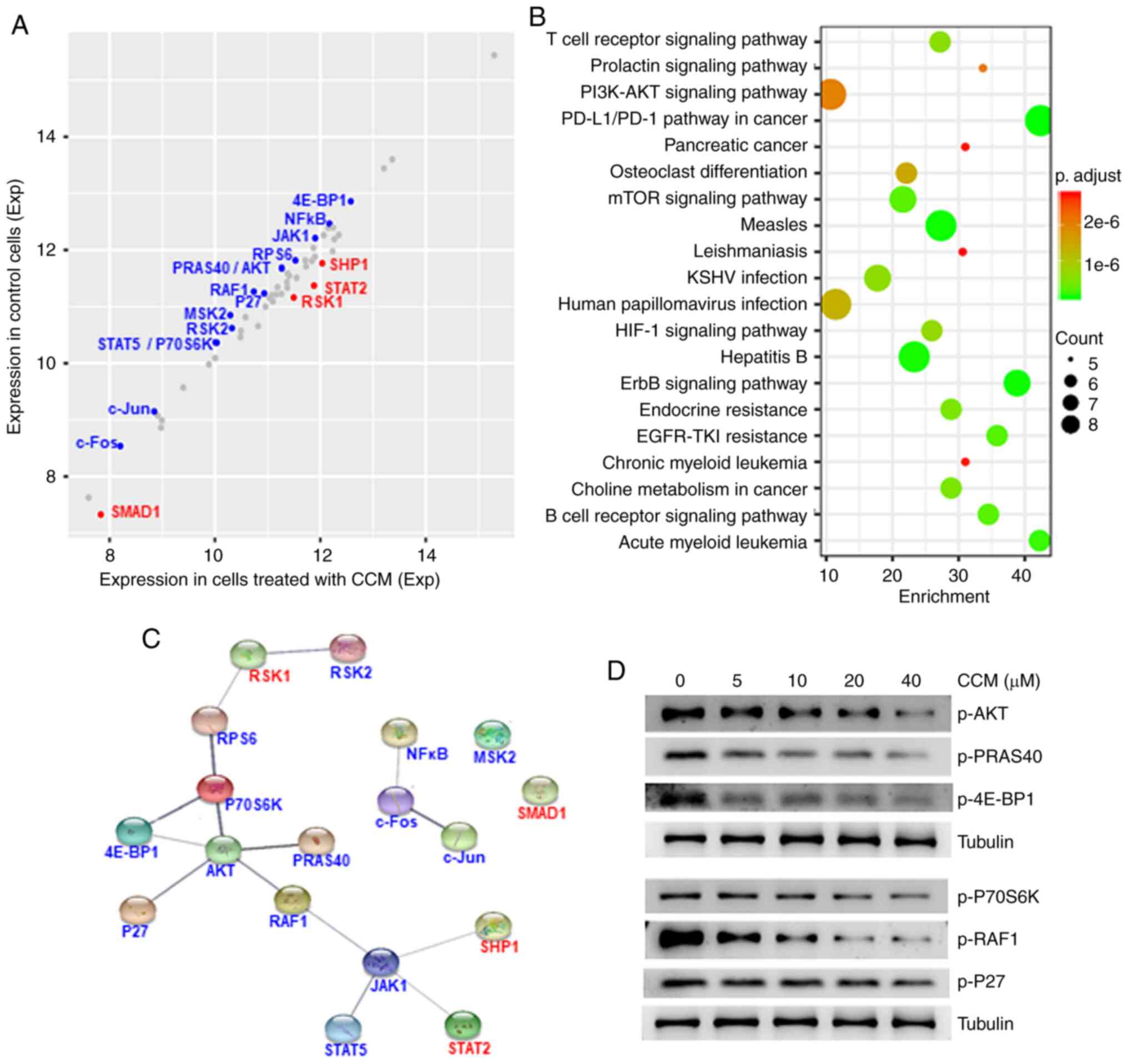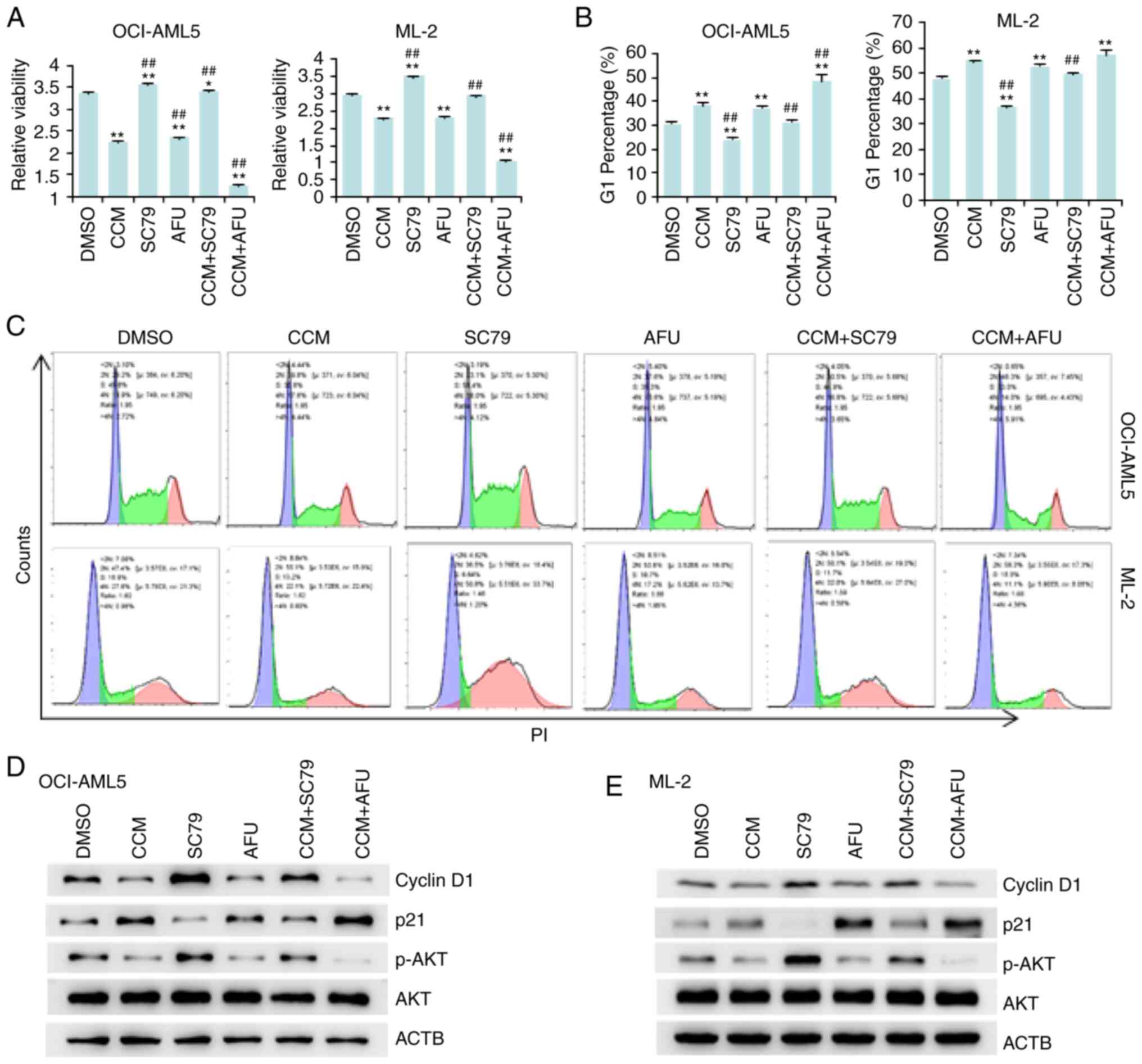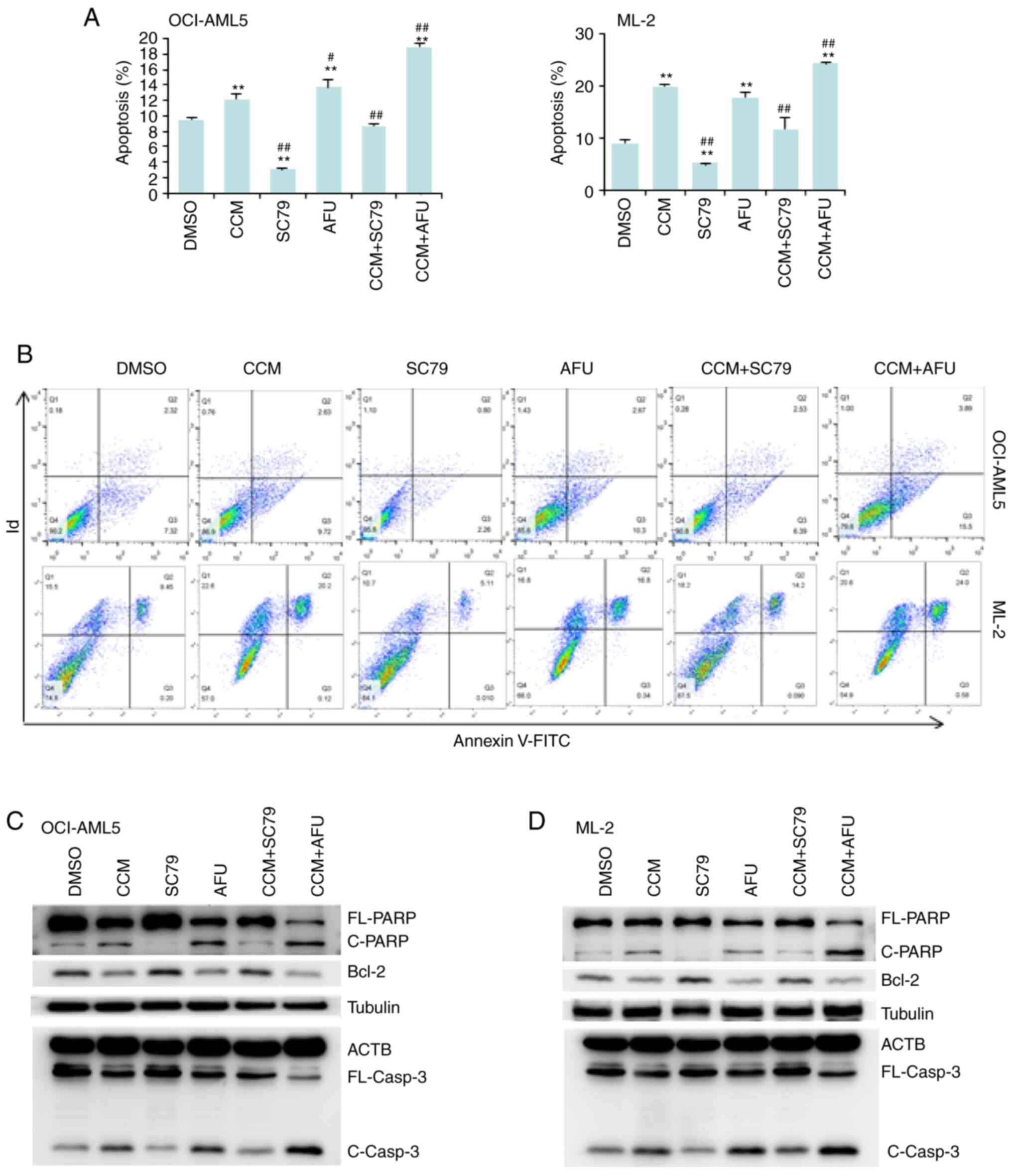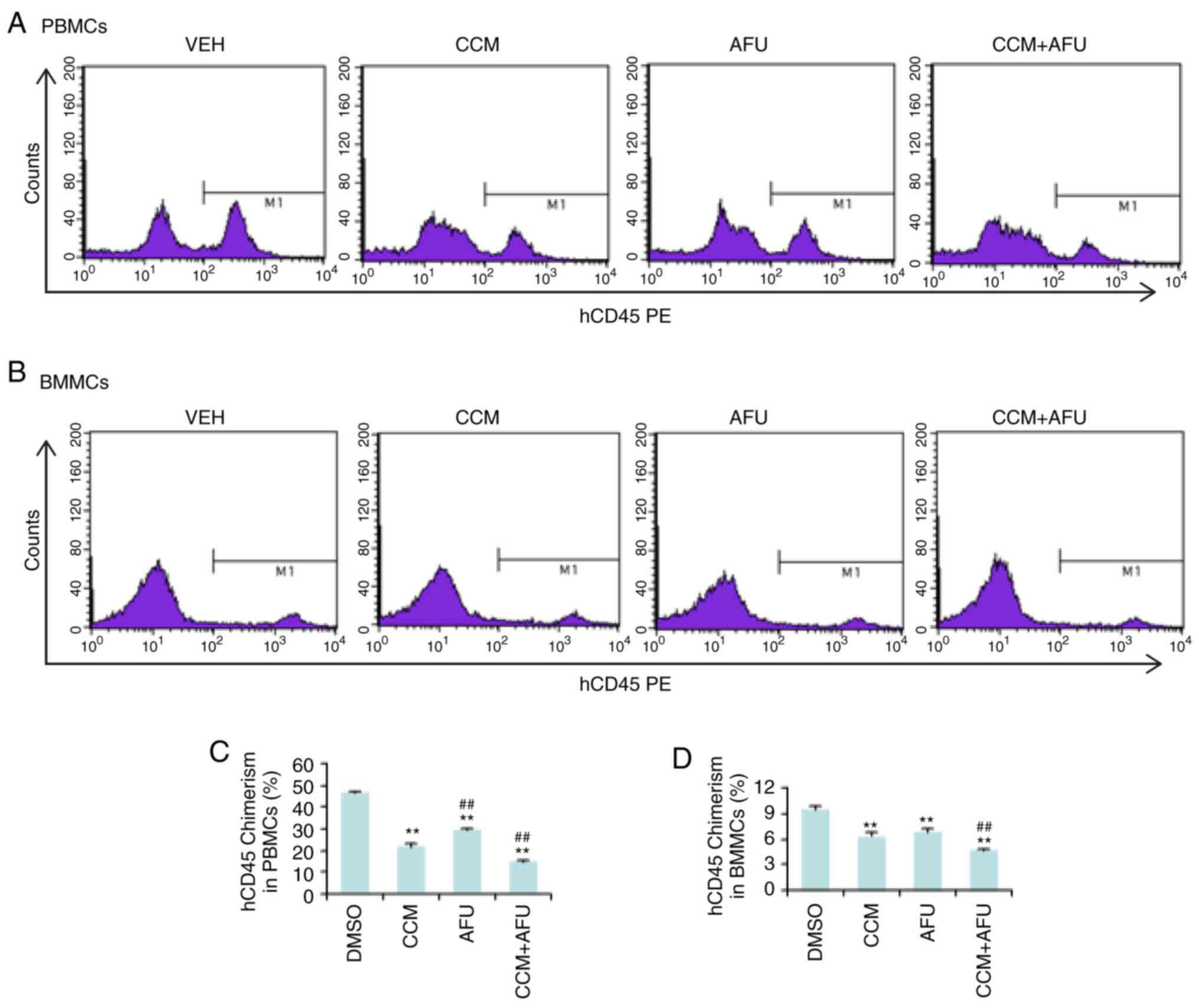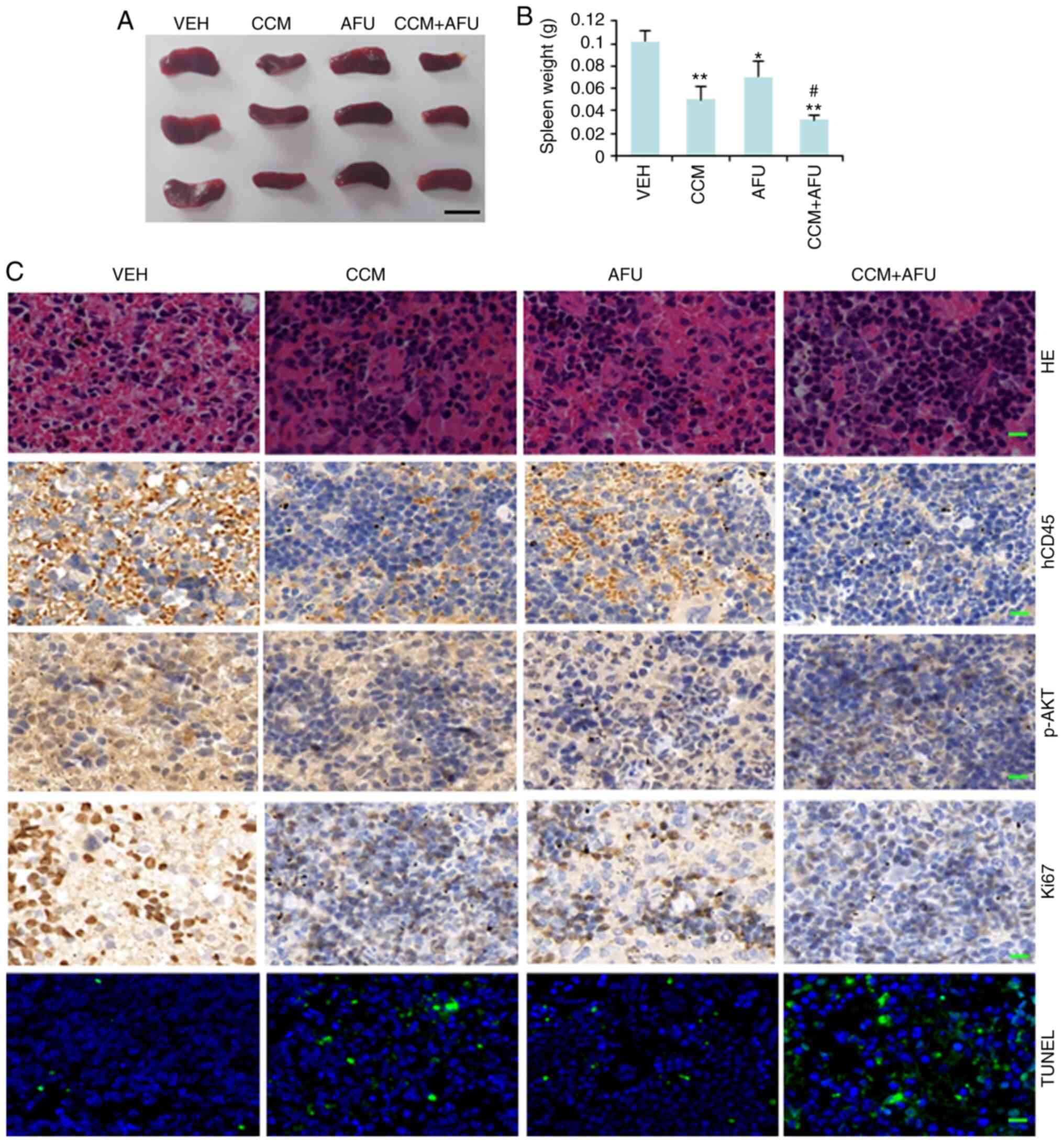|
1
|
Döhner H, Weisdorf DJ and Bloomfield CD:
Acute myeloid leukemia. N Engl J Med. 373:1136–1152. 2015.
View Article : Google Scholar : PubMed/NCBI
|
|
2
|
Tallman MS, Wang ES, Altman JK, Appelbaum
FR, Bhatt VR, Bixby D, Coutre SE, De Lima M, Fathi AT, Fiorella M,
et al: Acute myeloid leukemia, version 3.2019, NCCN clinical
practice guidelines in oncology. J Natl Compr Cancer Netw.
17:721–749. 2019. View Article : Google Scholar
|
|
3
|
Oran B and Weisdorf DJ: Survival for older
patients with acute myeloid leukemia: A population-based study.
Haematologica. 97:1916–1924. 2012. View Article : Google Scholar : PubMed/NCBI
|
|
4
|
Sami SA, Darwish NHE, Barile ANM and Mousa
SA: Current and future molecular targets for acute myeloid leukemia
therapy. Curr Treat Options Oncol. 21:32020. View Article : Google Scholar : PubMed/NCBI
|
|
5
|
Wang XJ, Chen JY, Fu LQ and Yan MJ: Recent
advances in natural therapeutic approaches for the treatment of
cancer. J Chemother. 32:53–65. 2020. View Article : Google Scholar : PubMed/NCBI
|
|
6
|
Kian MM, Salemi M, Bahadoran M, Haghi A,
Dashti N, Mohammadi S, Rostami S, Chahardouli B, Babakhani D and
Nikbakht M: Curcumin combined with thalidomide reduces expression
of STAT3 and Bcl-xL, leading to apoptosis in acute myeloid leukemia
cell lines. Drug Des Devel Ther. 14:185–194. 2020. View Article : Google Scholar : PubMed/NCBI
|
|
7
|
Liang K, Bae KH, Nambu A, Dutta B, Chung
JE, Osato M and Kurisawa M: A two-pronged anti-leukemic agent based
on a hyaluronic acid-green tea catechin conjugate for inducing
targeted cell death and terminal differentiation. Biomater Sci.
8:497–505. 2019. View Article : Google Scholar : PubMed/NCBI
|
|
8
|
de Blas E, Estañ MC, Del Carmen Gomez de
Frutos M, Ramos J, Del Carmen Boyano-Adánez M and Aller P: Selected
polyphenols potentiate the apoptotic efficacy of glycolytic
inhibitors in human acute myeloid leukemia cell lines. Regulation
by protein kinase activities. Cancer Cell Int. 16:702016.
View Article : Google Scholar : PubMed/NCBI
|
|
9
|
Li Y, Guo Y, Feng Z, Bergan R, Li B, Qin
Y, Zhao L, Zhang Z and Shi M: Involvement of the PI3K/Akt/Nrf2
signaling pathway in resveratrol-mediated reversal of drug
resistance in HL-60/ADR cells. Nutr Cancer. 71:1007–1018. 2019.
View Article : Google Scholar : PubMed/NCBI
|
|
10
|
Giordano A and Tommonaro G: Curcumin and
cancer. Nutrients. 11:23762019. View Article : Google Scholar
|
|
11
|
Liczbinski P, Michałowicz J and Bukowska
B: Molecular mechanism of curcumin action in signaling pathways:
Review of the latest research. Phytother Res. 34:1992–2005. 2020.
View Article : Google Scholar : PubMed/NCBI
|
|
12
|
Borges GA, Elias ST, Amorim B, de Lima CL,
Coletta RD, Castilho RM, Squarize CH and Guerra EN: Curcumin
downregulates the PI3K-AKT-mTOR pathway and inhibits growth and
progression in head and neck cancer cells. Phytother Res.
34:3311–3324. 2020. View
Article : Google Scholar : PubMed/NCBI
|
|
13
|
Li Y, Sun W, Han N, Zou Y and Yin D:
Curcumin inhibits proliferation, migration, invasion and promotes
apoptosis of retinoblastoma cell lines through modulation of
miR-99a and JAK/STAT pathway. BMC Cancer. 18:12302018. View Article : Google Scholar : PubMed/NCBI
|
|
14
|
Hosseini A, Rasmi Y, Rahbarghazi R,
Aramwit P, Daeihassani B and Saboory E: Curcumin modulates the
angiogenic potential of human endothelial cells via FAK/P-38 MAPK
signaling pathway. Gene. 688:7–12. 2019. View Article : Google Scholar : PubMed/NCBI
|
|
15
|
Zhou J, Duan H, Xie Y, Ning Y, Zhang X,
Hui N, Wang C, Zhang J and Zhou J: MiR-193a-5p targets the coding
region of AP-2alpha mRNA and induces cisplatin resistance in
bladder cancers. J Cancer. 7:1740–1746. 2016. View Article : Google Scholar : PubMed/NCBI
|
|
16
|
Kouhpeikar H, Butler AE, Bamian F, Barreto
GE, Majeed M and Sahebkar A: Curcumin as a therapeutic agent in
leukemia. J Cell Physiol. 234:12404–12414. 2019. View Article : Google Scholar : PubMed/NCBI
|
|
17
|
Zhou C, Zhao XM, Li XF, Wang C, Zhang XT,
Liu XZ, Ding XF, Xiang SL and Zhang J: Curcumin inhibits
AP-2γ-induced apoptosis in the human malignant testicular germ
cells in vitro. Acta Pharmacol Sin. 34:1192–1200. 2013. View Article : Google Scholar : PubMed/NCBI
|
|
18
|
Yang L, Qiu J, Xiao Y, Hu X, Liu Q, Chen
L, Huang W, Li X, Li L, Zhang J, et al: AP-2βinhibits
hepatocellular carcinoma invasion and metastasis through Slug and
Snail to suppress epithelial-mesenchymal transition. Theranostics.
8:3707–3721. 2018. View Article : Google Scholar : PubMed/NCBI
|
|
19
|
Carlos-Reyes A, Lopez-Gonzalez JS,
Meneses-Flores M, Gallardo-Rincón D, Ruíz-García E, Marchat LA,
Astudillo-de la Vega H, de la Cruz ON and López-Camarillo C:
Dietary compounds as epigenetic modulating agents in cancer. Front
Genet. 10:792019. View Article : Google Scholar : PubMed/NCBI
|
|
20
|
He X and Zhang J: Why do hubs tend to be
essential in protein networks? PLoS Genet. 2:e882006. View Article : Google Scholar : PubMed/NCBI
|
|
21
|
Masamha CP and Benbrook DM: Cyclin D1
degradation is sufficient to induce G1 cell cycle arrest despite
constitutive expression of cyclin E2 in ovarian cancer cells.
Cancer Res. 69:6565–6572. 2009. View Article : Google Scholar : PubMed/NCBI
|
|
22
|
Georgakilas AG, Martin OA and Bonner WM:
p21: A two-faced genome guardian. Trends Mol Med. 23:310–319. 2017.
View Article : Google Scholar : PubMed/NCBI
|
|
23
|
Prijic S, Ugrina I, Labar B, Nemet D,
Batinić J, Zadro R, Ries S, Gjadrov-Kuvedžić K, Davidović S and
Batinić D: Prognostic significance of constitutive
phosphatidylinositol 3-kinase/akt and mitogen-activated protein
kinase phosphorylation in acute myeloid leukemia. Leuk Lymphoma.
56:2281–2288. 2015. View Article : Google Scholar : PubMed/NCBI
|
|
24
|
Qin Z, Li Y, Li Y and Liu G: Tumor
necrosis factor alpha stimulates proliferation of dental pulp stem
cells via akt/glycogen synthase kinase-3β/cyclin D1 signaling
pathway. J Endod. 41:1066–1072. 2015. View Article : Google Scholar : PubMed/NCBI
|
|
25
|
Hu Z, Long T, Ma Y, Zhu J, Gao L, Zhong Y,
Wang X, Wang X and Li Z: Downregulation of GLYR1 contributes to
microsatellite instability colorectal cancer by targeting p21 via
the p38MAPK and PI3K/AKT pathways. J Exp Clin Cancer Res.
39:762020. View Article : Google Scholar : PubMed/NCBI
|
|
26
|
Wan YJ, Yang Y, Leng QL, Lan B, Jia HY,
Liu YH, Zhang CZ and Cao Y: Vav1 increases bcl-2 expression by
selective activation of rac2-akt in leukemia T cells. Cell Signal.
26:2202–2209. 2014. View Article : Google Scholar : PubMed/NCBI
|
|
27
|
Blagden SP, Hamilton AL, Mileshkin L, Wong
S, Michael A, Hall M, Goh JC, Lisyanskaya AS, DeSilvio M, Frangou
E, et al: Phase IB dose escalation and expansion study of AKT
inhibitor afuresertib with carboplatin and paclitaxel in recurrent
platinum-resistant ovarian cancer. Clin Cancer Res. 25:1472–1478.
2019. View Article : Google Scholar : PubMed/NCBI
|
|
28
|
Yamaji M, Ota A, Wahiduzzaman M, Karnan S,
Hyodo T, Konishi H, Tsuzuki S, Hosokawa Y and Haniuda M: Novel
ATP-competitive Akt inhibitor afuresertib suppresses the
proliferation of malignant pleural mesothelioma cells. Cancer Med.
6:2646–2659. 2017. View Article : Google Scholar : PubMed/NCBI
|
|
29
|
Chen CI, Paul H, Le LW, Wei EN, Snitzler
S, Wang T, Levina O, Kakar S, Lau A, Queau M, et al: A phase 2
study of ofatumumab (Arzerra®) in combination with a
pan-AKT inhibitor (afuresertib) in previously treated patients with
chronic lymphocytic leukemia (CLL). Leuk Lymphoma. 60:92–100. 2019.
View Article : Google Scholar : PubMed/NCBI
|















